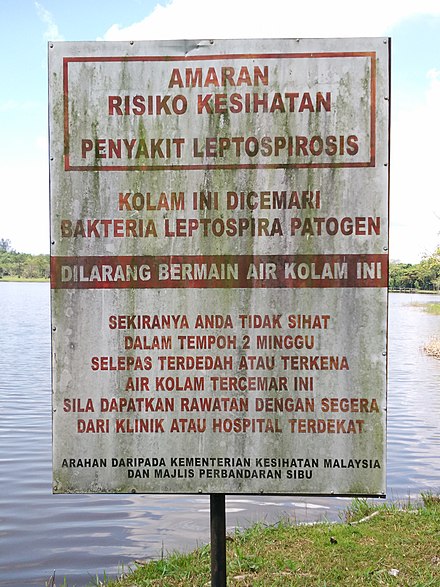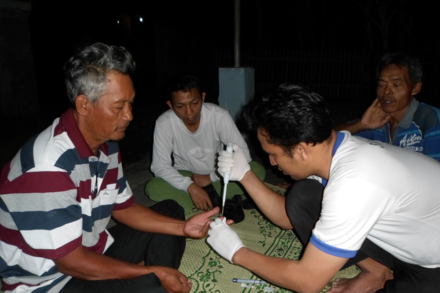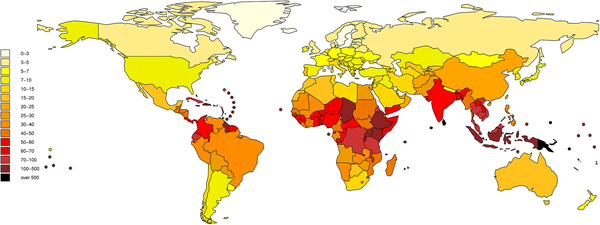Leptospirosis
Leptospirosis is a blood infection caused by the bacteria Leptospira, which can infect humans, dogs, rodents, and numerous wild and domesticated animals. The disease can range from mild symptoms such as headaches, muscle pains, and fevers to severe manifestations like lung bleeding or meningitis. The severe form, known as Weil's disease, can cause jaundice, kidney failure, and bleeding. The bacteria are primarily spread by rodents through urine or faeces, contaminating water or soil, which can then infect humans through contact with the eyes, mouth, nose, or breaks in the skin.
Signs and Symptoms
The symptoms usually appear one to two weeks after infection. Most cases (90%) are mild, but 10% can develop severe symptoms. Initial symptoms include sudden fever, chills, intense headache, severe muscle aches, especially in the calf and lower back, and abdominal pain. A characteristic feature is conjunctival suffusion (red conjunctiva) without exudate, rarely found in other febrile illnesses.


In severe cases, jaundice, kidney failure, and bleeding may occur. Other complications include meningitis, lung haemorrhage, and severe pulmonary haemorrhage syndrome.
Cause
Leptospirosis is caused by spirochaete bacteria belonging to the genus Leptospira, which are right-handed helical bacteria. A total of 66 species have been identified, with 19 species known to cause severe disease in humans. The bacteria are transmitted through contaminated water or soil, often linked to poor sanitation or exposure to animals.

Diagnosis
Diagnosis involves various laboratory tests. A complete blood count may show elevated white cells and low platelet counts. Kidney involvement is indicated by elevated blood urea and creatinine levels. Serological tests like the enzyme-linked immunosorbent assay (ELISA) can quickly detect IgM antibodies. The microscopic agglutination test (MAT) is the reference standard for diagnosis.


Prevention
Preventive measures include improving housing, sanitation, rodent control, and flood mitigation. Personal protective equipment (PPE) is essential for individuals at high occupational risk. Human vaccines exist but are not widely available and have limited efficacy. Doxycycline is effective as a prophylactic antibiotic.


Treatment
Most cases of leptospirosis resolve spontaneously, but early antibiotic treatment can prevent severe disease. For mild cases, doxycycline, azithromycin, ampicillin, or amoxicillin are recommended. Severe cases require intravenous antibiotics like benzylpenicillin or ceftriaxone. Supportive care includes intravenous hydration and dialysis when necessary. Corticosteroids may be considered, but their efficacy is not well established.
Prognosis
The overall risk of death ranges from 5-10%, increasing to 50-70% in cases involving severe lung complications. Long-lasting symptoms may include weakness, muscle pain, and headaches. Eye complications such as uveitis can occur in 10% of recovered patients, typically within six months post-infection.
Epidemiology
Approximately one million severe cases and 58,900 deaths occur annually, with a higher prevalence in tropical and subtropical regions. The global burden of leptospirosis is significant but often underreported due to diagnostic challenges and lack of mandatory notification in many countries.

Self-assessment MCQs (single best answer)
What is the primary cause of leptospirosis?
Which of the following is a characteristic symptom of leptospirosis?
What is the severe form of leptospirosis called?
How is leptospirosis primarily transmitted?
Which diagnostic test is considered the reference standard for leptospirosis?
What is the recommended treatment for mild cases of leptospirosis?
What is a common preventive measure for leptospirosis?
Which organ is commonly affected in severe cases of leptospirosis?
What is the estimated annual global death toll from severe leptospirosis?
In which regions is leptospirosis most prevalent?
Dentaljuce
Dentaljuce provides Enhanced Continuing Professional Development (CPD) with GDC-approved Certificates for dental professionals worldwide.
Founded in 2009 by the award-winning Masters team from the School of Dentistry at the University of Birmingham, Dentaljuce has established itself as the leading platform for online CPD.
With over 100 high-quality online courses available for a single annual membership fee, Dentaljuce offers comprehensive e-learning designed for busy dental professionals.
The courses cover a complete range of topics, from clinical skills to patient communication, and are suitable for dentists, nurses, hygienists, therapists, students, and practice managers.
Dentaljuce features Dr. Aiden, a dentally trained AI-powered personal tutor available 24/7 to assist with queries and provide guidance through complex topics, enhancing the learning experience.
Check out our range of courses, or sign up now!


